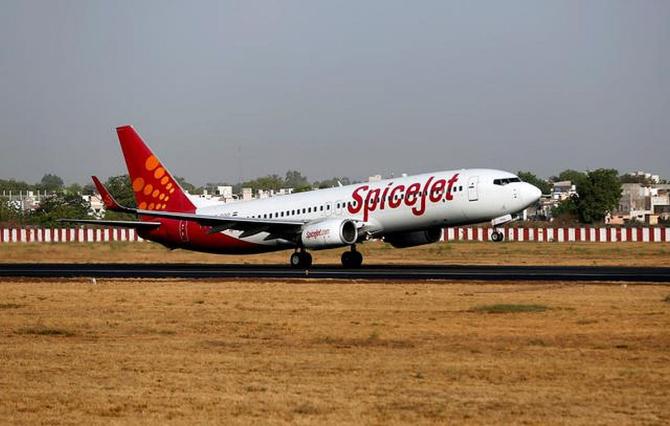In a new development, the Madras high court has stayed its earlier order of winding up SpiceJet and the airline will soon initiate "appropriate remedial steps including preferring an appeal" against the order before a higher bench, the company said on Tuesday.

In a filing to BSE, the budget carrier said the Madras high court had on Monday issued an order of "winding up SpiceJet and appointment of official liquidator" in a case filed by Credit Suisse claiming non-payment of $24.01 million dues to engine maintenance services firm SRT Technics.
"The Madras HC despite holding that SRT did not have a valid authorization from DGCA to carry out engine maintenance during the currency of the agreement rejected the company's defence and ordered winding up of the company and directed the official liquidator to take over the assets of the company," SpiceJet noted.
However, on the same day, the Madras high court issued another order wherein it stayed its previous order and gave SpiceJet "a period of three weeks, subject to the condition that the company deposits the amount equivalent to $5 million within a period of two weeks."
"The company is examining the order and shall initiate appropriate remedial steps including preferring an appeal before the appellate jurisdiction within the time frame allowed by the Madras High Court," SpiceJet noted.
The carrier further said it has a good case on merits and was hopeful of having favourable outcome in the appeal.
SpiceJet reported a net loss of Rs 934.8 crore and Rs 998.3 crore in 2019-20 and 2020-21, respectively.
It had reported a net loss of Rs 729 crore for the quarter ending June 2021 as its flight operations were affected due to the second wave of the COVID-19 pandemic.
Earlier, the court was allowing a company petition from Credit Suisse AG, a stock corporation registered under the laws of Switzerland, which prayed for winding up of the Indian firm under the provisions of the Companies Act, 1956 and appoint the Official Liquidator of the high court as the liquidator with all powers under Section 448 of the Companies Act to take charge of SpiceJet's assets, properties, stock in trade and books of accounts.
The "respondent company (SpiceJet) has miserably failed to satisfy the three pronged test suggested by the Supreme Court in Mathusudan Govardhandas & Co v Madhu Woollen Industries (P) Ltd, and hence had rendered itself liable to be wound up for its inability to pay its debts under Section 433 (e) of the Companies Act 1956," Justice R Subramanian said in his order on Monday and directed the private carrier be wound up and the official liquidator take over its assets.
According to the petitioner, SpiceJet had availed of the services of SR Technics, Switzerland, for maintenance, repair and overhauling of aircraft engines, modules, components, assemblies and parts, which are mandatory for its operations.
An agreement for performance of such services for a period of 10 years was entered into between SpiceJet and SR Technics on November 24. 2011.
The terms of payments were also agreed.
On August 24, 2012 a supplemental agreement was also entered into to change certain terms of the agreement.
The amendments included extension of time for payment of money due under various invoices and also a deferred payment scheme.
Since there was a general increase in the cost, the 2012 supplemental agreement included adjustment of flight hour rates and provisions for escalation were also made.
Upon provision of the services under the agreement, SR Technics had raised invoices and SpiceJet had issued seven bills of exchange for the monies due under the invoices.
It also acknowledged the debts from time to time by issuing certificates of acceptance in relation to the bills of exchange which would imply the respondent had not disputed the correctness of the claim made in the invoices.
The petitioner, namely Credit Suisse AG, entered into a financing agreement in September 2012 with SR Technics and under a transaction agreement, the latter assigned all its present and future rights to receive payments under the agreement to the petitioner company.
The assignment included the Bills of exchange issued by SpiceJet pursuant to the 2011 agreement and the 2012 supplementary agreement.
In view of the assignments made by SR Technics, the petitioner is entitled to receive payments of the monies due under the seven invoices from Spicejet, petitioner company claimed.
The petitioner has been making repeated requests to the airline to make payments under various invoices.
Since it did not honour its commitment under the agreements with SR Technics and that SpiceJet is not in a position to meet its financial obligations, the petitioner issued a statutory notice.
As there was no response, it preferred the present company petition before the High Court to wind up SpiceJet.
SpiceJet contended the alleged debts are not legally enforceable and as such there cannot be a winding up order under Section 433 of the Companies Act.
The petitioner is not a creditor of SpiceJet and in the absence of any contractual relationship of a debtor and creditor, a winding up proceeding will not lie.
The agreements between SpiceJet and SR Technics do not authorise assignment to the present petitioner.
SR Technics had also issued a notice under Section 434 of the Companies Act in January 2015 and did not pursue the winding up, it argued and claimed that there was no liability to pay the very debt.
Rejecting the contentions, the judge said that a reading of certain Clauses in the agreement would show the parties to the contract are bound to fulfill all obligations which occurred prior to the termination and it will not prevent either party from claiming against breach of any obligations under the agreement including recovery of excess payments made by SpiceJet to SR Technics.
The above clause would make it very clear that while it was open to SpiceJet to terminate the contract for the reason that SR Technics did not have a valid authorisation, the termination by itself would not relieve SpiceJet of the obligations that arose under the contract prior to such termination becoming effective.
Admittedly, SpiceJet had not chosen to terminate the contract.
It had continued to avail the services.
"Therefore in my opinion, it cannot now turn around and say, there is a violation of the provisions of the Aircraft Act or the C.A.R.
"Rules made there under and therefore the liability ceased. I thus find that the respondent Company has miserably failed to satisfy the three pronged test suggested by the Hon'ble Supreme Court in Mathusudan Govardhandas & Co v Madhu Woollen Industries (P) Ltd, supra, and hence had rendered itself liable to be wound up for its inability to pay its debts under Section 433 (e) of the Companies Act 1956.
"I am therefore of the opinion that this Company Petition should be allowed and the respondent Company directed to be wound up.
"The Official Liquidator is directed to take over the assets of the respondent Company," the judge said.
Photograph: Amit Dave/Reuters











 © 2025
© 2025